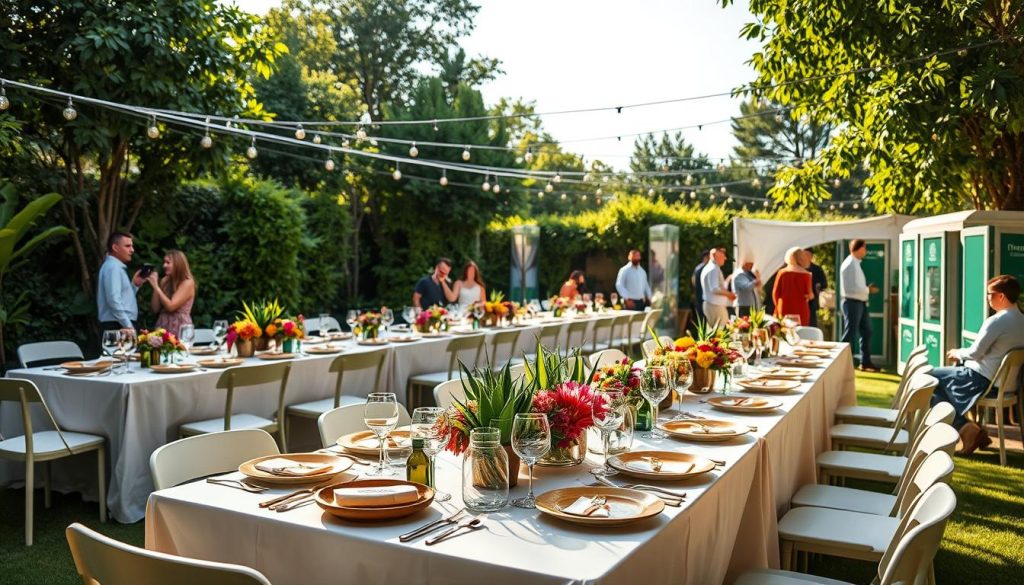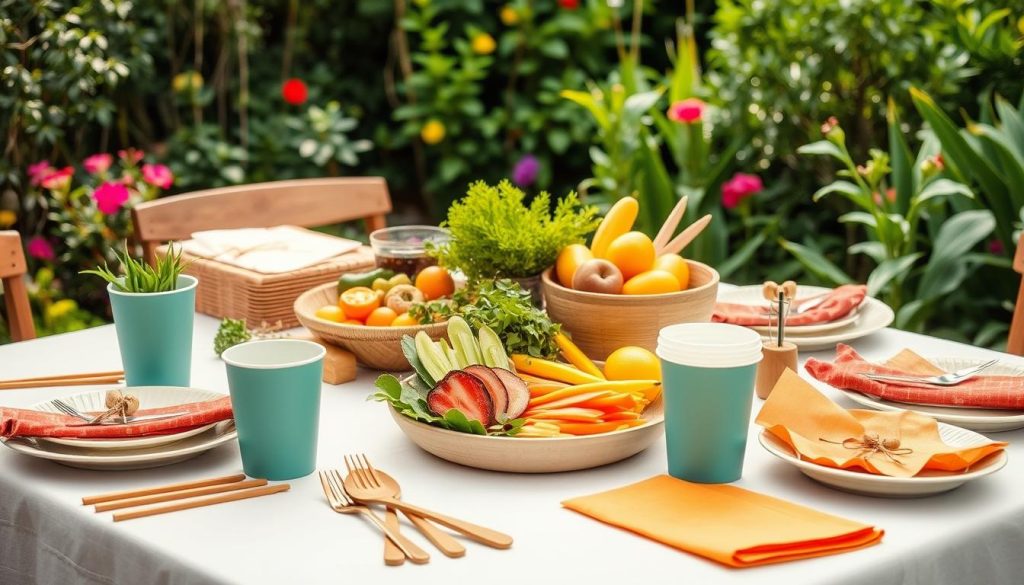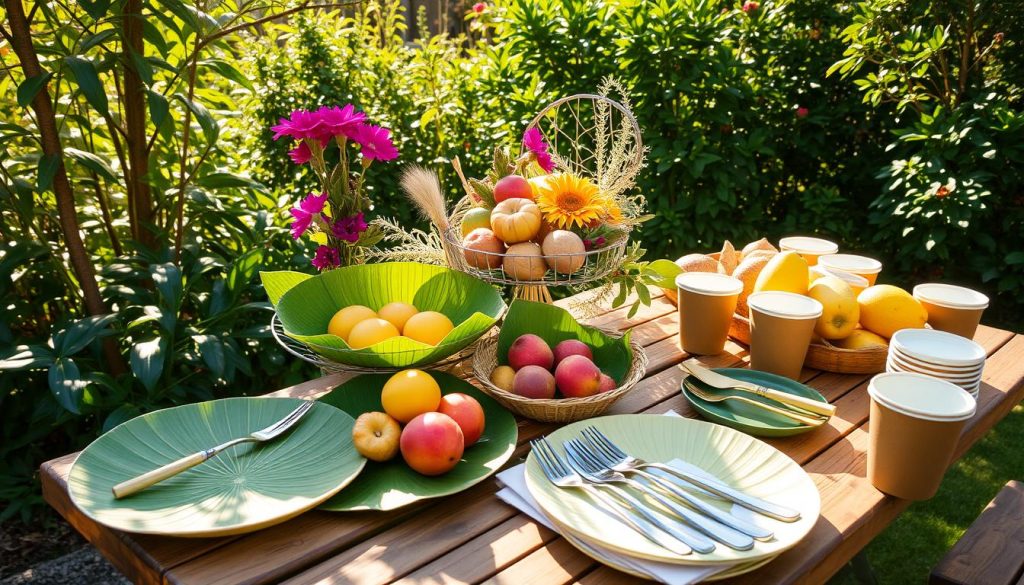Biodegradable Supplies
Advances in Biodegradable Catering Supplies for 2025
Imagine planning an event where every piece of packaging makes a difference. Every plate, fork, and cup isn’t just practical. Each one contributes to a sustainable future, breaking the cycle of waste threatening our oceans. The move to biodegradable catering supplies is critical. It’s an answer to the dire environmental crises we’re facing, marked by the loss of marine wildlife and seabirds annually due to plastic pollution.
The market for biodegradable food packaging is set to soar, reaching $12.06 billion by 2025 from $4.65 billion. This surge reflects a shift in consumer priorities, with 66% considering sustainability before buying. This heightened consciousness is pushing caterers and event organisers towards eco-friendly, biodegradable options. These choices showcase a commitment to environmental care and corporate responsibility.
Current advancements in sustainable packaging are not just good for the planet. They’re transforming event experiences. Every choice you make has the power to drive this positive change. By 2025, embracing biodegradable catering supplies will revolutionise the industry. This commitment will ensure the preservation of Australia’s stunning landscapes and biodiversity for future generations.
Key Takeaways
- 66% of consumers prioritise sustainability when making purchases.
- The biodegradable food packaging market is projected to grow significantly by 2025.
- Over 100,000 marine animals and 1 million seabirds suffer annually due to plastic waste.
- Many consumers are influenced by sustainability in food and beverage purchases.
- Cost is a significant barrier for brands switching to biodegradable options.
- Major brands are setting goals to achieve 100% sustainable alternatives by 2025.
The Importance of Sustainable Catering Solutions
Now more than ever, shifting to sustainable catering solutions is not just advantageous—it’s imperative. Traditional catering supplies, which are mainly made from plastic, pose a huge environmental threat. They significantly contribute to pollution and carbon emissions. By choosing eco-friendly alternatives, businesses can lessen these harms and help ensure a sustainable future.
Environmental Impact of Traditional Catering Supplies
The impact of traditional catering supplies on the environment is vast, extending well beyond just waste. The production of plastic items produces harmful emissions, which play a part in climate change. Shockingly, the food system is responsible for producing 25-30% of global emissions. Hence, moving towards sustainable catering solutions is vital for lessening this impact.
The detrimental effects of plastic are clear, with 8.3 billion tonnes produced worldwide since the 1950s. This number is expected to climb to 34 billion tonnes by 2050 if we don’t act now.
Consumer Demand for Eco-Friendly Alternatives
Customers are increasingly focusing on sustainability when making purchases. According to a McKinsey & Company survey, 66% of consumers look for sustainability when spending their money. This shift indicates a soaring demand for eco-friendly options, offering caterers a lucrative opportunity.
Providing plant-based dishes, compostable tableware, and locally sourced ingredients not only appeals to eco-conscious customers. It also boosts the attractiveness of your catering services.
Emerging Trends in Biodegradable Catering Supplies
The catering industry is embarking on a journey towards sustainability, significantly reducing its environmental footprint. This shift towards zero-waste events mirrors growing ecological concerns. It encompasses strategies to reduce, reuse, and recycle, paving the way for a more sustainable catering experience.
Shifts Towards Zero-Waste Events
Consider zero-waste strategies for your next event. Focusing on compostable materials, like biodegradable cutlery, is crucial for eco-conscious gatherings. Using such products allows participants to reduce waste significantly. It also demonstrates a strong sustainability commitment. Consumers are increasingly choosing companies that share their environmental values, benefiting businesses with an eco-friendly focus.
Introduction of Plant-Based Menus
The popularity of plant-based menus is growing. Serving dishes with local, seasonal plant ingredients reduces the carbon footprint, contrasting with meat-centred meals. This shift reflects a desire for environmental alignment and healthier dining options. By offering plant-based choices, your catering service leads in adopting trends valued by eco-aware attendees.

Biodegradable Catering Supplies: Innovations in Materials
Innovations in biodegradable materials are transforming catering supplies significantly. The move towards sustainable practices brings several eco-friendly options to forefront. These include plant-based plastics, mushroom mycelium, and seaweed packaging. These materials offer both practical advantages and help reduce the environmental damage caused by traditional plastics.
Plant-Based Plastics
Plant-based plastics are becoming increasingly popular, indicating a shift in consumer behaviour. Made from renewable resources like cornstarch and sugarcane, they present numerous benefits. Unlike conventional plastics, which persist for centuries, these biodegradable alternatives decompose in a far shorter period. With the biodegradable food packaging market worth $4.65 billion in 2023, it’s projected to surge to $12.06 million by 2025, at a CAGR of 17.04%.
Use of Mushroom Mycelium and Seaweed
Materials such as mushroom mycelium and seaweed packaging are leading the change in sustainable catering supplies. Mushroom mycelium decomposes quickly without leaving detrimental residues. Seaweed packaging, developed by companies like NotPla, offers an eco-friendly choice with minimal environmental impact. These alternatives ensure our packaging choices support the environment positively. With around 66% of consumers prioritizing sustainability, industries are urged to embrace these innovative materials.
| Material Type | Source | Biodegradability | Environmental Impact |
|---|---|---|---|
| Plant-Based Plastics | Cornstarch, Sugarcane | Breaks down within months | Low ecological footprint |
| Mushroom Mycelium | Fungi | Breaks down naturally | Renewable and compostable |
| Seaweed Packaging | Seaweed | Completely biodegradable | Reduces plastic waste |
Key Features of Modern Biodegradable Catering Supplies
The trend towards eco-friendly catering solutions is becoming prominent. It reveals crucial attributes that position modern biodegradable catering supplies as the top choice. These products are crafted with advanced materials and designs. This approach not only addresses environmental challenges but also meets practical requirements effectively.
Durability and Leak-Proof Design
Among their most notable features is the durable catering supplies range. This line prioritizes both functionality and environmental preservation. The products are known for their leak-proof design, safeguarding food safety at various events. They exhibit impressive tensile strength and resist moisture well. This ensures the products remain dependable across different catering scenarios.
Composting Capabilities
The advancement doesn’t stop at durability; many supplies offer composting capabilities. These items decompose naturally, benefiting the soil and advancing a circular economy. By integrating biodegradable features into their operations, caterers reduce waste. They also support sustainable farming methods. Opting for these cutting-edge supplies allows event organizers to aid in lowering waste. At the same time, they cater to a market that values environmental responsibility.

Benefits of Switching to Biodegradable Catering Supplies
Switching to biodegradable catering supplies significantly benefits businesses focused on environmental sustainability. These advantages are in line with sustainability goals and rising consumer expectations.
Compliance with Sustainability Goals
Biodegradable supplies help achieve sustainability goals effectively. They often lead to savings in energy and water, boosting operational efficiency. As environmental awareness grows, adopting sustainable practices attracts customers. They prefer supporting socially responsible companies.
The initial cost of eco-friendly supplies might be higher. However, the long-term savings, like lower disposal fees and better energy efficiency, make it worthwhile.
Enhanced Brand Reputation
Moving to eco-friendly catering reduces environmental harm and enhances your brand’s reputation. Customers appreciate companies with ethical practices. Using biodegradable supplies shows your sustainability commitment, promoting customer loyalty.
Attention to your supplies’ certifications can increase your credibility. It reassures customers about your sustainability efforts. Regularly updating and reviewing your practices ensures they make a positive impact on your audience.
Challenges in Adopting Biodegradable Catering Supplies
Moving to biodegradable catering supplies poses several hurdles for businesses keen on sustainable practices. The cost of these eco-friendly options often surpasses traditional materials, impacting budgets and profitability. This financial aspect requires careful thought by caterers striving for a balance between being eco-friendly and economically viable.
Cost Considerations
In Australia, the challenge for many caterers lies in incorporating biodegradable alternatives without raising costs too much. The upfront cost of sustainable materials might put off some in the industry. It’s vital to recognize the long-term perks such as diminished waste management costs and enhanced brand image. Despite the higher initial expense, the possibility of saving on energy and reducing waste might offer financial upsides.
Consumer Awareness and Education
For sustainable catering to take off, consumer awareness is key. Many are still unaware of biodegradable products’ benefits and their correct disposal methods. Teaching consumers about compostability’s value and how biodegradable supplies lessen environmental harm is crucial in increasing sustainable choices’ adoption. Such educational efforts are necessary to navigate the hurdles in embracing eco-friendly solutions.
Innovative Companies Leading the Way
The drive for sustainable catering solutions is gaining speed, thanks to forward-thinking companies dedicated to green practices. Delving into compostable packaging highlights how firms like Better Earth are revolutionizing the field. These enterprises don’t just produce biodegradable items. They ensure these products perform well and function effectively.
Better Earth: A Leading Brand in Compostable Packaging
Better Earth stands at the forefront of the compostable packaging industry. This trailblazer presents a range of eco-friendly catering items, appealing to consumers and businesses alike. It merges environmental care with realistic applications, meeting catering demands sustainably. Through continuous research and development, Better Earth provides top-notch, compostable options that resonate with today’s eco-conscious consumers.
European Brands Paving the Path for Sustainability
Throughout Europe, various brands are advancing in sustainable packaging. They utilize cutting-edge technology and ethical material sourcing to craft waste-reducing solutions. From plant-based plastics to bamboo containers, these European companies are defining the standards for green practices. They are not just growing their businesses; they’re aiding the catering industry’s move towards total sustainability.
Case Studies of Successful Zero-Waste Events
The Australian event scene has undergone a significant shift towards sustainability. Zero-waste case studies highlight this change, emphasizing community involvement and effective strategies. These events have set a benchmark for sustainability, showcasing the feasibility of eco-friendly practices. They have also fostered strong partnerships with recycling bodies, enhancing waste management.
Examples from the Australian Event Scene
A number of Australian events have embraced zero-waste goals:
- Glastonbury Festival: While originating in the UK, its sustainable practices have become a model for Australian festivals, focusing on reducing waste and ethical sourcing.
- Green Kitchen: By using locally sourced ingredients, this initiative reduces transportation impacts and supports local farmers, promoting sustainability.
- Harrow School: This education institution integrates sustainability into its catering services, teaching students about the importance of ethical food sourcing.
Partnerships with Local Recycling Efforts
To achieve zero-waste goals, collaborations with local recycling entities are vital. These partnerships facilitate effective waste management and boost environmental awareness. Key strategies include:
- Adopting compostable products to lower landfill contributions.
- Educating event-goers on sorting waste correctly.
- Working with municipal authorities to improve recycling efficiency.
The commitment to eco-consciousness in the Australian event sector is evident. By choosing responsible sourcing and enhancing recycling efforts, zero-waste events are now a reality. Such approaches aid the environment and foster community benefits, proving the value of sustainability in the event industry.
| Event | Key Sustainable Strategy | Outcome |
|---|---|---|
| Glastonbury Festival | Waste reduction initiatives | Significant decrease in landfill contributions |
| Green Kitchen | Locally sourced food | Supported regional farmers and reduced carbon footprint |
| Harrow School | Involvement of students in sourcing | Enhanced awareness of food ethics |
Future Projections for Biodegradable Catering Supplies
By 2025, the shift towards biodegradable catering supplies is predicted to accelerate. This growth reflects changing consumer preferences and a deeper commitment to sustainability. Many firms are now prioritizing eco-friendly practices. These factors make the industry’s future look promising.
Market Growth and Consumer Trends
The expansion of biodegradable catering supplies mirrors a wider push for sustainable products. It’s forecasted that by 2026, the biodegradable packaging market will hit USD 118.85 billion. This will happen at a compound annual growth rate of 6.35% from 2021 to 2026. This growth trend is linked to an increased eco-consciousness.
About 75% of organizations are adopting eco-friendly packaging. Yet, only 30% feel ready to meet regulatory and internal sustainability aims. Millennials, notably, prefer eco-friendly food options, with 60% supporting such choices. This demonstrates the necessity for brands to evolve and align with new consumer values.
Technological Advancements on the Horizon
Technological innovation is key to the biodegradable catering supplies market’s expansion. New materials, like plant-based plastics and alternatives made from bagasse and cornstarch, are emerging. Such developments make sustainable options more viable and affordable.
This progress not only raises product quality but also caters to the eco-friendly demands of consumers. Companies such as MVI ECOPACK lead in providing biodegradable solutions, replacing traditional materials with renewable ones. Through technological investment and embracing change, businesses can strengthen their standing and contribute to a sustainable future.
Why You Should Consider Biodegradable Catering Supplies
Opting for biodegradable catering supplies is a vital move towards eco-responsibility in your operations. These products decrease waste and meet the rising demand for eco-friendly options amongst consumers. Switching to biodegradable options elevates your brand as an environmental leader. It attracts customers concerned about their ecological footprint.
Vegware™ offers biodegradable catering supplies, presenting a viable solution to traditional disposables. Their compostable coffee cups, plates, and straws help lower your events’ carbon impact. Studies indicate these green supplies require less production energy and reduce hazardous chemical releases from non-biodegradable items. Thus, they secure a greener future.
Moreover, adopting biodegradable products can boost your business’s reputation and cultivate customer loyalty. It shows your commitment to eco-friendly efforts and addresses major global environmental challenges. Investing in these supplies not only impresses your clientele but also portrays your catering service as conscientious. This responsible approach benefits the planet and may enhance your profitability.

